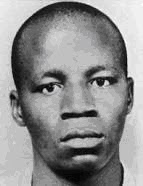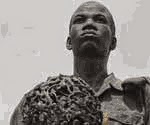‘My blood
will nourish the tree that will bear the fruits of freedom. Tell my people that
I love them. They must continue the fight.’
Solomon Kalushi Mahlangu – 10/07/1956 – 6/04/1979
The
Amandla! Editorial Collective joins millions of our compatriots, comrades and
friends in South Africa and around the world in congratulating the African
National Congress on celebrating its centenary. As the first liberation
movement on the African continent, we join in celebrating 100 years of the
struggle for liberation. Like the ANC itself, we celebrate the contribution of
the thousands of women and men who gave up their lives in the struggle for
freedom under the banner of the black, green and gold. There are too many to
really single out. However, one comrade stands out for his heroism: Solomon
Kalushi Mahlangu. His dying words conjure the Che Guevara–like spirit of
sacrifice and love that drove many to fight for freedom. There was no
thought of what they could get out of the struggle, what rewards or
entitlements. Liberation, a life of dignity and the end of ALL forms of
oppression and exploitation is what consumed fighters like Solomon Mahlangu.
Imagine the lonely walk to the gallows, found guilty for crimes he did not
commit and having the courage and love for the people to say: ‘Tell my people
that I love them. They must continue the fight.’
Leaving
aside the fact that apartheid has been overcome, can we imagine such commitment
and sacrifice for noble ideals in present-day South Africa?
More
and more people join the ANC to swell its ranks for ideals that are completely
opposite those of comrades like Solomon Mahlangu. They join in the hunt for
enrichment and status. The ANC in power is being turned into a movement that
offends its history of struggle.
Under
the modern ANC – the ANC in power, the ANC that controls the South African
state − the conditions of the majority of our people are appalling. Official
unemployment has increased from 13% in 1994 to between 24 and 25% today.
When those who have given up looking for work are included, unemployment stands
closer to 40%! Having a job is no guarantee of a decent life. More than a third
of all workers earn less than R1000 per month. Inequality has widened since the
end of apartheid. This is not explained alone by the unfavourable international
conditions in which the South African economy is integrated. Most of all, the
failure to live up to the dreams for a new South Africa, which were so alive in
1994, is explained by a set of domestic policies that favour one part of
society at the expense of the other.
Consider
the following: for the whole period from 1995 to 2005 − since which wage
statistics based on regular household surveys have disappeared − the real wages
for all formally employed workers earning less than R200 000 per year have
remained stagnant (see diagram), averaging below R3000 per month. It is a
shocking and unacceptable fact that liberation, economically speaking, did not
change ordinary South African formal work-life. It is reasonable to assume,
given the increase in unemployment since the 2008 recession and the increased
role of labour brokers, that real wages for the mass of ordinary workers has
declined!
In
terms of how the primary division of the national income between profits and
wages has been developing since liberation, we are going backwards, not
forwards. Since liberation, the capitalists, to put it bluntly, have controlled
an ever-growing share of the growing national income (GDP). In 1994, the wage
share to GDP was 55.9%. In 2010 it had fallen to 50.6%. Bear in mind that the
wage share includes the remuneration of top management and (in some instances)
even employers. This year, goods and services will be produced in South Africa
to the value of about R3 000 billion. The 5% point drop in the wage share of
the growing national income between 1994 and 2012 corresponds to R150 billion
which, this year alone, will not be paid out to ordinary employees.
For
millions of people, independent of their consciousness or their will, the
struggle continues. They have no alternative. Every day in ‘liberated’ South
Africa workers go on strike, communities protest lack of decent services, women
struggle against violence and abuse, youth the lack of jobs and the loss of
hope. An ANC of the people must make the radical changes that are demanded and
ought to be joining these struggles, helping to inspire the new Solomon
Mahlangus who will fight the good fight. That should be the guarantee of 100
more years.
In the
current South Africa, Solomon Mahlangu would most likely repeat his words:
‘Tell my people that I love them. They must continue the fight.’

